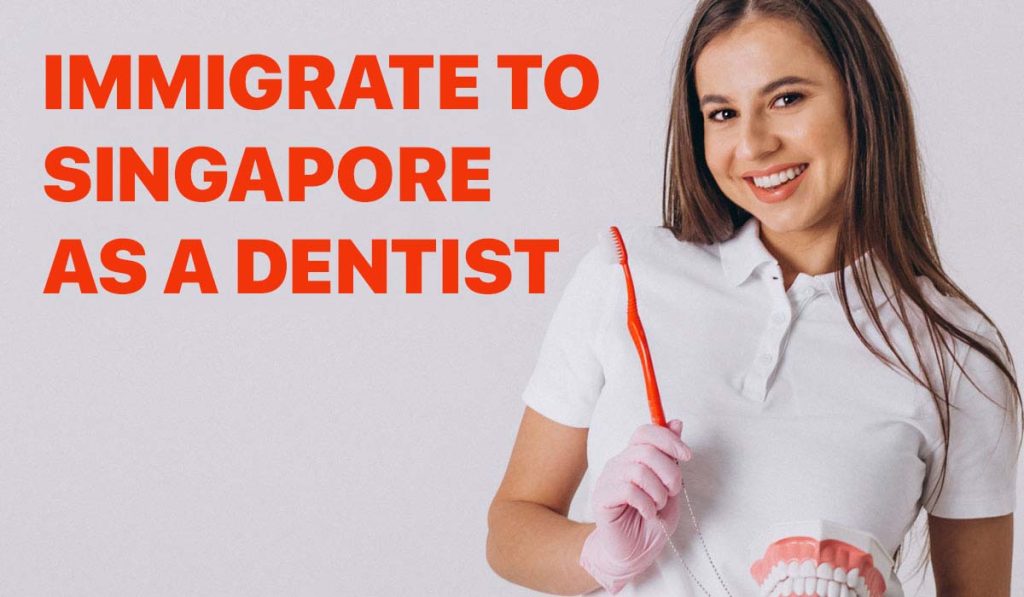Singapore offers an enticing pathway for aspiring dentists to embark on a rewarding career journey. With esteemed universities, comprehensive programs, and a vibrant healthcare environment, foreign students can fulfill their dream of becoming dentists in this dynamic nation. However, it’s crucial to understand the educational landscape, admission procedures, and career prospects to make informed decisions.
How Can a Foreigner Work and Immigrate to Singapore as a Dentist?
Singapore is an exciting destination for dentists who want to work in a dynamic and multicultural healthcare environment. Yet, there are a few steps they should follow:
- Research Licensing Requirements
- Apply for a Valid Work Pass
- Secure Employment
- Register with Singapore Dental Council
- Obtain Professional Liability Insurance
- Complete Medical Examination
- Find Accommodation
- Arrive in Singapore
- Attend Orientation
- Begin Dental Practice
Step 1. Research Licensing Requirements
Foreign dentists intending to practice in Singapore should begin by conducting comprehensive research on the licensing requirements established by the Singapore Dental Council (SDC). These prerequisites usually entail possessing an accredited dental qualification from a recognized institution, demonstrating clinical competence, and satisfying specific educational and professional criteria. A thorough understanding of these conditions is crucial for foreign dentists to ascertain their eligibility to practice dentistry in Singapore.
Step 2. Apply for a Valid Work Pass
Once foreign dentists have met the licensing requirements and secured a job offer, the next step is to apply for a valid work pass, such as an Employment Pass (EP) or S Pass. The application process involves the prospective employer submitting the application to the Ministry of Manpower (MOM) on behalf of the dentist. Requirements include meeting minimum salary thresholds, possessing the necessary qualifications, and passing medical examinations. Upon approval, the work pass allows foreign dentists to practice in Singapore legally.
Step 3. Secure Employment
Securing employment in Singapore entails actively searching for job opportunities through various channels, including online job portals like JobStreet, MyCareersFuture.sg, and HealthJobs.sg. Recruitment agencies specializing in healthcare, such as Achieve Group, Recruit Express Healthcare, and Randstad, can also provide personalized job-matching services. Creating profiles on multiple platforms and collaborating with recruitment agencies can enhance the chances of securing dental employment in Singapore.
Step 4. Register with Singapore Dental Council
Foreign dentists must register with the Singapore Dental Council (SDC) to practice dentistry in Singapore. The registration process involves submitting a comprehensive application to the SDC, providing evidence of dental qualifications, professional experience, and relevant documents. The SDC assesses the application to ensure compliance with Singapore’s dental regulatory standards. Registration with the SDC is a vital step for foreign dentists to practice dentistry in Singapore legally.
Step 5. Obtain Professional Liability Insurance
Dentists practicing in Singapore are required to obtain professional liability insurance from reputable providers approved by the Singapore Dental Council. This insurance is essential to protect both dentists and their patients in case of unforeseen incidents or malpractice claims. Dentists must ensure their insurance coverage meets the specified requirements and standards set by the SDC.
Step 6. Complete Medical Examination
Foreign dentists are typically required to undergo a comprehensive medical examination as part of the work pass application process. Approved medical institutions in Singapore conduct this examination, which assesses the dentist’s health and fitness for dental practice. Meeting the health standards set by the Ministry of Manpower (MOM) is essential for work pass approval.
Step 7. Find Accommodation
Securing suitable accommodation in Singapore is a crucial step for foreign dentists. The cost of housing could be significantly different based on factors such as location and type of housing. Online platforms like PropertyGuru, 99.co, and Rent in Singapore are helpful for finding rental properties. Initiating the accommodation search well in advance of arrival is advisable.
Step 8. Arrive in Singapore
Arriving in Singapore involves booking a flight and coordinating travel arrangements. Essential documents, including the passport, work pass, and employment contract, should be prepared for immigration and customs procedures at Changi Airport. Coordination with the employer and accommodation arrangements ensures a smooth transition to life and work in Singapore.
Step 9. Attend Orientation
Orientation is a critical onboarding step for foreign dentists. Healthcare institutions organize orientation programs to introduce new dental staff to workplace policies, procedures, safety measures, and cultural sensitivity training. Active participation in orientation activities is essential for a seamless transition into dental practice in Singapore.
Step 10. Begin Dental Practice
Starting dental practice in Singapore requires acclimating to the workplace, understanding local dental protocols, and providing high-quality dental care while adhering to healthcare standards and regulations set by the Singapore Dental Council (SDC). Continuous professional development is essential for staying tuned in the field.
If you like to learn more about the immigration process for a dentist in different countries, you can read our articles.

What is the Average Salary for a Dentist in Singapore?
The average salary in Singapore for a dentist differs depending on factors such as experience, qualifications, and the type of dental practice they are associated with. On average, dentists in Singapore can earn a competitive monthly salary ranging from SGD 5,000 to SGD 10,000 or more. Senior and specialized dentists may command higher incomes. Additionally, many dental practices in Singapore offer attractive packages that may include benefits and allowances.
Learn more about immigrating to Singapore as a doctor with our comprehensive article.
Is there a need for more dentists in Singapore?
As for the shortage of dentists in Singapore, the country has been actively recruiting both local and foreign dental professionals to meet the growing demand for dental services. While there may be occasional variations in demand across different specialties and regions, Singapore’s healthcare sector has generally made efforts to address any shortages by encouraging foreign dentists to practice in the country.
Can a UK dentist work in Singapore?
Yes, a UK dentist can work in Singapore, but specific steps and requirements must be met to practice dentistry legally. Foreign dentists, including those from the UK, typically need to fulfill the licensing and registration requirements set by the Singapore Dental Council (SDC). This includes submitting their qualifications, evidence of professional experience, and other relevant documents for assessment by the SDC. Once the necessary approvals and registrations are obtained, UK dentists can practice dentistry in Singapore and contribute to the country’s healthcare system.
How Can I Study and Become a Dentist in Singapore?
To study and become a dentist in Singapore, you should follow the steps below:
- Research Dental Programs
- Meet Admission Requirements
- Apply to Universities
- Apply for a Student Visa
- Commence Dental Education
- Complete Internship and Licensing
- Begin Dental Practice
Step 1. Research Dental Programs
International students aspiring to become dentists in Singapore should begin by researching dental programs offered by universities in the country. They should explore various universities, both public and private, and carefully review the admission requirements, curriculum, and program duration. It’s essential to ensure that the chosen program goes within their educational goals and career aspirations.
Step 2. Meet Admission Requirements
To gain admission to a dental program in Singapore, foreign students must meet specific admission requirements set by the respective universities. These requirements typically include a recognized high school diploma or equivalent qualification, completion of prerequisite courses in science subjects, and fulfilling English language proficiency criteria, often through standardized tests like IELTS or TOEFL. Meeting these requirements is crucial for securing a place in a dental program.
Step 3. Apply to Universities
Foreign students should prepare their applications for dental programs at their chosen universities. They should complete the university’s application form and submit all required documents, including academic transcripts, letters of recommendation, a personal statement, and proof of English language proficiency. It’s essential to adhere to application deadlines and ensure that all documents are accurately submitted to increase the chances of acceptance.
Step 4. Apply for a Student Visa
Once admitted to a dental program, foreign students must submit an application for a student visa to study in Singapore. This involves submitting a visa application to the Immigration and Checkpoints Authority (ICA) or the Ministry of Education (MOE). Students should provide proof of acceptance from the university, demonstrate sufficient financial means to cover tuition and living expenses and undergo medical examinations if required. Upon approval, the student visa allows them to reside and study in Singapore legally.
Step 5. Commence Dental Education
After obtaining a student visa, foreign students can commence their dental education in Singapore. They will embark on a rigorous curriculum that includes both theoretical coursework and practical clinical training. Dental students should actively engage in their studies, participate in clinical rotations, and adhere to the program’s academic requirements to progress successfully toward their goal of becoming a dentist.
Step 6. Complete Internship and Licensing
During their dental education, students will typically undergo internship and clinical training. Upon graduation, they will need to complete additional requirements, including successfully passing licensing examinations conducted by the Singapore Dental Council (SDC) to practice dentistry in Singapore. These exams assess the student’s clinical competence and knowledge of Singapore’s dental standards and regulations.
Step 7. Begin Dental Practice
Upon obtaining the necessary licensing and fulfilling all academic requirements, foreign students can embark on their careers as dentists in Singapore. They may choose to work in private dental practices, hospitals, or other healthcare institutions, contributing their skills and expertise to the country’s healthcare system. Continuous professional development and staying tuned with industry trends are crucial for a successful dental practice in Singapore.
How Long Does It Take to Become a Dentist in Singapore?
Becoming a dentist in Singapore is a comprehensive journey that typically takes around 5 to 6 years of education and training after completing high school. The process includes earning a bachelor’s degree in dentistry, which generally spans about 4 years. Following the academic phase, aspiring dentists must complete a mandatory internship and successfully pass licensing examinations. This ensures that they are well-prepared to provide quality dental care in Singapore. Some individuals may choose to follow further specialization or advanced studies, which can extend the timeline of their educational journey.
What Are the Best Universities to Study Dentistry in Singapore?
Singapore boasts some of the best universities to study dentistry, offering world-class education and state-of-the-art facilities. Among these, the National University of Singapore (NUS) and the Nanyang Technological University (NTU) are highly regarded choices for dental education. These institutions provide comprehensive dental programs that offer students the knowledge, skills, and clinical experience required to excel in the field of dentistry. Their distinguished faculty and research opportunities further enhance the quality of dental education in Singapore.
How Much Does It Cost to Study and Become a Dentist in Singapore?
The cost of studying dentistry in Singapore can vary depending on several components, including the university, the specific program, and whether the student is a local or international candidate. On average, foreign students can expect to pay tuition fees ranging from SGD 28,000 to SGD 55,000 per year for their dental education. It’s important to note that in addition to tuition fees, students should budget for living expenses, books, dental equipment, and other miscellaneous costs. However, there are opportunities for scholarships and financial aid that alleviate some of the financial burden for eligible students pursuing their dream of becoming dentists in Singapore.
Conclusion
In conclusion, Singapore offers a promising and comprehensive pathway for aspiring dentists. With world-class universities, rigorous educational programs, and ample opportunities for professional growth, foreign students can confidently pursue their dream of becoming dentists in this dynamic and healthcare-forward nation.
FAQs
Yes, there are scholarships for eligible international dental students.
No, completing a local internship is mandatory for a dental practice in Singapore.
The dental internship typically lasts one year.
Yes, universities in Singapore offer various specialized dental fields.
Apply for a student visa through the Immigration and Checkpoints Authority (ICA) or the Ministry of Education (MOE).
How useful was this article?
Click on a star to rate it!
Average rating 4.3 / 5. Vote count: 9
No votes so far! Be the first to rate this article.
- Author
- Max-B.
- February 13, 2024





